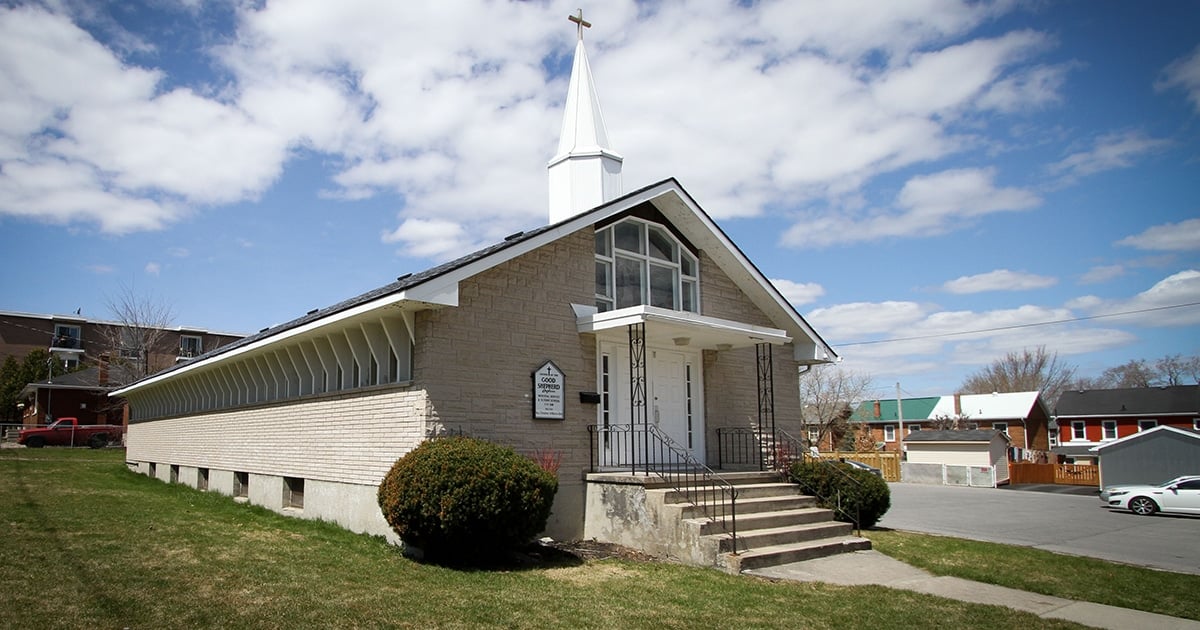Helping families in need is the driving force behind Habitat for Humanity, an international non-profit that provides affordable housing for low-income families. For any Habitat affiliate, however, a major challenge always remains: securing land.
Such is the case for Habitat for Humanity Greater Kingston and Frontenac. In the city of Kingston, Ont., a lack of available land has made it increasingly difficult for the local Habitat affiliate to find property for new housing builds.
Enter the Anglican diocese of Ontario. With church properties for sale in the Kingston area, the diocese has entered into an innovative partnership with the local chapter of Habitat for Humanity. The diocese has gifted the property on which the Good Shepherd Mission currently stands. Habitat will build five new homes along with a community ministry/outreach centre on the property.
A meeting between Bishop Michael Oulton and Habitat for Humanity Kingston board member Dave Nolan paved the way for a memorandum of understanding, maintaining the church’s presence in the area while providing homes for families in need.
“When the opportunity came along to take a piece of property which would accommodate … five homes, it was very appealing to us,” Habitat for Humanity Kingston CEO David McGrath said, noting the added benefit of the property being on residential land rather than a former industrial or commercial site.
“Every diocese has churches for sale,” diocesan executive officer Alex Pierson said. “We have several. One option for us would have been to deconsecrate, and then list it and sell it.
“But this is really about a different opportunity … This was about thinking differently. It was about thinking: where is there opportunity here? And more importantly: where is there opportunity for new types of ministry within the diocese and within the city of Kingston?”
The surplus of churches within the diocese is the result of changing trends over recent history, which has seen fewer Anglicans worshipping on Sundays and many congregations increasing in age.
The city of Kingston itself has seen numerous changes of its own, with certain areas contracting and others experiencing notable growth. Socioeconomic disparities have posed their own challenges in certain parts of the city, such as the more economically depressed northern area where the Good Shepherd Mission is located.
“One of the needs in that particular area is housing,” said the Rev. Valerie Kelly, priest in charge of Holy Trinity Church in Lombardy and priest associate at Kingston North Anglican Ministries. “That’s how Habitat came to be working with us on what to do with that piece of property that the church exists on.”
“Gifting that property to Habitat seemed like the most worthwhile and Christian-oriented approach to take,” Pierson said.
Working with the School of Urban and Regional Planning at Queen’s University and talking to representatives from the City of Kingston, the diocese determined that the most crucial needs in the area were outreach programs for children and seniors, many of whom live below the poverty line.
The Habitat for Humanity affiliate is currently working with the City of Kingston to iron out zoning, permits and other legal issues. According to one prospective timeline, the diocese would deconsecrate the Good Shepherd Mission sometime after Easter and hold a joint event in spring or early summer cementing the partnership between the diocese, Habitat and the city.
After tearing down the church, construction of the new units would likely begin in late summer or early fall. The ministry outreach centre would be built first, followed by the first of the living units in spring 2017, after which the remaining housing units would be constructed two at a time.
Once built, the new outreach centre will include Sunday and midweek Anglican worship services while offering a range of programs and services for children and seniors. Possible ideas include a library, before- and after-school programs, and social gatherings for seniors such as card playing.
The partnership between the Ontario diocese and Habitat for Humanity may well serve as the model for future collaborations between Habitat and other denominations as well as between Anglicans and other community groups.
“It’s a good working relationship and we both are approaching this recognizing that it’s a new way of working for both of us, so I find it very easy to work with the diocese,” McGrath said.
“People are very understanding of what our needs are and we try to respond to the needs of the diocese itself.”
For the diocese of Ontario, the opportunity to help low-income families while transforming its outreach into the community represents an exciting new approach to ministry, reflecting the brand it wishes to create for itself in a changing society.
“What do we want to be and what do people think of when you think of our diocese?” Pierson asked. “This type of community outreach, I think, is an early expression of what that’s going to look and feel like.”
